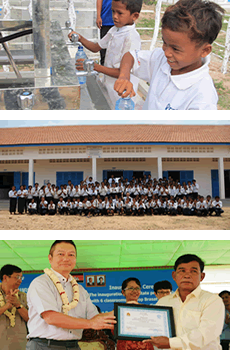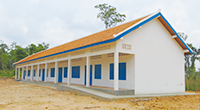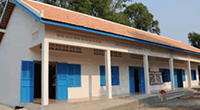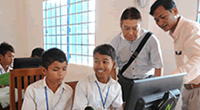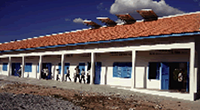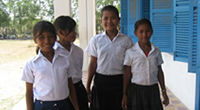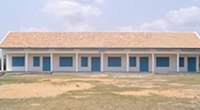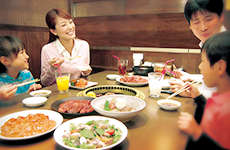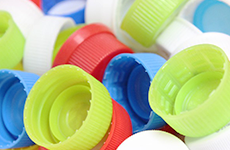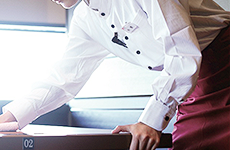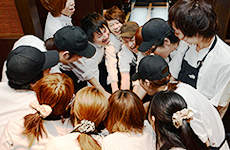
One Dining, which has always been community-based, has participated in CSR activities since its Dairiki days. Funds and goods are donated not only within Japan, but also to Cambodia. Cambodia’s educational system was destroyed under the dictatorial Pol Pot group, and many children could not receive education because even the nearest schools were often 10 to 20 kilometers away. We decided to help Cambodia rebuild its schools and educational programs with the help of Plan Japan. 1% of our profit before taxes are used according to what is necessary at the time. How the money is spent is shared within the company, and reports are given before, during, and after aid efforts. One Dining will continue supporting Cambodian schools as a part of our commitment to our community and society.
Our contribution
1. School building with 5 classrooms
2. Desks, chairs, whiteboards, teacher desks, and other classroom equipment
3. Toilets
4. Wells
5. Construction training program
Our contribution
1. 2 school buildings with 3 classrooms each
2. Preparation kits for kindergarten readiness
3. Teaching materials
4. Playground equipment etc.
Our contribution
1. School building with 6 classrooms including one computer room
2. School grounds
3. Solar generator and computers
4. Various equipment
Our contribution
1. 1 building with 6 classrooms including 1 library
2. Solar generator and computers
3. Hand-pumped well and water cleaning system
Our contribution
1. 1 building with 6 classrooms and indoor toilet
2. Desks, chairs, and other equipment for the 6 classrooms
3. Sporting equipment, books, and other equipment
Our contribution
1. 1 building with 4 classrooms and playground equipment
2. Desks, chairs, and other equipment for 4 classrooms
3. Hand-pumped well and indoor toilet
Through serving meat and other dishes, One Dining wants to enlighten our customers to “eating correctly” for better health and eating habits. This is why One Dining takes active part in dietary education. Meat is an important food product for our health if consumed correctly, especially in a balanced diet including vegetables and fermented foods. In addition to providing dishes that are both delicious and safe, we want to continue informing the community on the importance of a balanced diet, and support healthy lifestyles.
At One Dining’s headquarters, all of our ECO caps are collected and recycled to become plastic bottles and other items, and the proceeds collected are used to provide vaccinations. This idea was born from a group of junior employees that regularly meets and discusses One Dining’s social contribution. The group is a work in progress, but it is important that our younger staff understand our passion to give back to the community, and help make it a reality.
Uniform Recycling Activity
At One Dining, we also recycle uniforms. When we update the design of the uniforms worn at our restaurants, we do not throw away the former uniforms, but de-thread them and recreate them into cloth bags and pencil cases. We are in the process of setting up this infrastructure. The completed items will be sent to Cambodia for students we are aiding. Further, we do not only recycle our uniforms but also ensure their long-time use. Uniforms that are supposed to last 2 to 3 years according to our manufacturers are used for 6 to 7 at One Dining.
Other Recycling Activities
Gridirons are usually considered disposable items and are relegated to landfills, but One Dining manufactured a washable stainless grid with the aid of a subcontractor, allowing their reuse. In addition, we started using “fushi chopsticks” a few years ago, which are now common throughout the industry. We also use phosphorus-free detergent in all restaurants for environmental protection. Due to our efforts, most of our restaurants have passed the effluent standards of Shiga prefecture, which are considered the most rigorous in Japan.
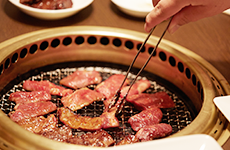


To ensure the long-term employment of persons with disabilities, we not only hire at the headquarters but also at our restaurants, and many take part in janitorial services. It is our responsibility to create an environment in which they can work to their potential, so we visualize all of their tasks through manuals with large photographs and legible writing. We also keep our restaurants spotless so they can concentrate on giving great service. This fosters camaraderie between all employees, creating motivation for them to work for the long term. Further, we want to use the know-how gathered through working with our disabled employees to provide the best service possible to our customers.




